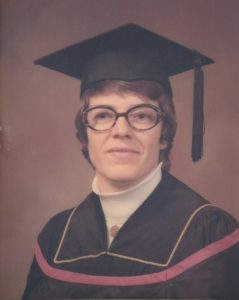
Dale on graduation from her BSN program in 1974
Born in Kelowna, BC in 1941, Dale entered the diploma nursing program at St. Paul’s Hospital in Vancouver in 1959, graduating in 1962. Following graduation, Dale became a community health nurse trainee in the Kootenays for a year, then went to work at a St. Paul’s medical unit, before enrolling at UBC to take what was then a diploma program in public health nursing (Dip PHN), which she completed in 1964. Following her completion of the Dip PHN program, Dale married and relocated with her husband to Toronto, where she worked in public health nursing for about three years and along the way gave birth to her son Jeffrey. At that time, public health nurses were being deployed in English as a Second Language schools to support the refugees who were coming to Canada, mainly from Greece, Italy, and other parts of Southern Europe. Dale held a half time position in that capacity and found it to be a very interesting first experience in working with displaced persons.
Returning back to the West Coast after three years in Toronto, Dale accepted a position at St. Mary’s Hospital in New Westminster. In keeping with having a small child in the household, she worked steady evening shifts for a couple of years on a medical unit. What interested her about that unit was that it was the first time she had encountered cardiac monitors, and she found there was a great deal to learn to be able to read them and optimize the care of complex cardiac patients.
When the Psychiatric Unit opened at UBC, Dale decided to seek a position there. Her primary motivation in making that shift was that she wanted to learn more about how to help the many patients she had encountered on the medical unit who were admitted with multiple comorbidities, including those related to mental health concerns. She remembers being frustrated that most of the internists on the medical unit had no interest whatsoever in the mental health aspects of their patients lives, or in helping them with the emotional aspects of their illnesses. She has a vivid memory of one woman who had been talking about her husband as if he had just died, although he had apparently died 12 years prior, and no one was able to thoughtfully deal with her protracted grief or make sense of the impact it was having on her overall health. Dale had had no formal psychiatric background in her own nursing training or career to that point, having applied to do one of her clinical nursing rotations in Essondale (the large residential mental health facility in Coquitlam, BC at that time), but not being among those chosen. So she was acutely aware of how little confidence she had in being supportive to her patients’ mental health.
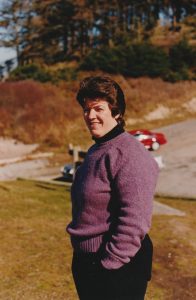
A young Dale Walker
Dale’s time working at the UBC Psychiatric Unit (1 West) included both direct care aspects and also coordinator responsibilities on the day shift. Not only did that role satisfy her desire to better understand mental health, but it also became her first taste of management-related work under the guidance of the Director of Nursing at that time, Helen Gemeroy (known to everyone as “Mrs. Gemeroy”). She worked alongside colleagues who became lifelong friends, including Mary Jane Duke and Joy Page (later Homewood), who both held head nurse positions on different clinical wards of the Psych Unit. One of Dale’s responsibilities as coordinator was to pick up reports from the head nurses, and she remembers being highly impressed by their capacity to conceptualize and write up reports of the patients under their care. Wanting to take the next step to learn that skill, and with Mrs. Gemeroy’s strong encouragement, Dale enrolled in the UBC BSN degree completion program for “returning RNs.”
Following BSN graduation in 1974, Dale found herself hired to teach in the School of Nursing. Under the leadership of then School Director, Dr. Muriel Uprichard, her job at the School was to help the “D students” integrate into the academic setting. [At that time, the students were commonly referred to by letter grouping – “A” was the 4-year program, “B” was public health diploma, “C” was a hospital administration certificate, and “D” was returning RNs.] Other roles Dale played during her time in the School included assisting Beth McCann in teaching the administration course; she remembers how much fun it was to work with Beth, who was a popular and highly respected faculty member. She also did clinical teaching with students going into the public health rotation – both baccalaureate degree and public health diploma students. Although she very much enjoyed that role, she realized that her contract would not be renewed after three years as she did not have a master’s degree. So for a period of 6 months, she did “nothing,” while she considered whether she wished to stay in nursing or do something else (actually she did end up babysitting a small child to help out a family she knew, and thoroughly enjoyed that hiatus in her work life, so she was not exactly idle).
Next, Dr. Mary Cruise, who had accepted the position of Director of Care at the brand new Purdy Pavilion Extended Care Unit at UBC, called on Dale to fill in as a nursing care manager for a few months. Dale ended in up staying a couple of years in that role, totally loving it and finding it very satisfying. She also thoroughly enjoyed working with Mary, who was a stellar role model of nursing administration and an indefatigable champion of nursing theory. Mary Cruise also became a lifelong friend.
Following the ECU position, Dale applied to and was admitted to the University of Portland Summer Master’s Program (it was distinctive on the West Coast at that time for having a nursing master’s program that only required residency in summer terms). During the winter terms, she did her electives at UBC and worked part-time orienting patient support workers to the Extended Care Unit. During one of those winters, she remembers having a part time job working as a nurse assessor with Long term Care with the City of Vancouver as she thought she might want to work with the elderly, and this program was just getting launched. She very much enjoyed six-week stints in different health care units as part of those teams.
A single mother of a young teen by this time, Dale had to move with her son to Portland on a tight budget over those three summers. Fortunately, she was able to make arrangements with former BC colleagues to make that possible. Betty Johnston had acquired a faculty position in Portland and her husband Gary Johnson, who had been a computer science faculty member at UBC, decided he too wanted to become a nurse. So the Johnson family (including three children) moved to Portland for several years, until Gary completed his master’s degree, before moving back so that they both could take faculty positions at the UBC School of Nursing. For each of those three summers, Dale and son Jeff pitched a tent in the Johnson backyard, Dale going off to School each weekday while Jeff hopped on a bike and went to the Girls and Boys Club.
By the time she completed her master’s degree, Dale had come to appreciate that academia was not for her, although the new UBC School of Nursing Director, Dr. Marilyn Willman, had invited her to apply for a position. Fortunately, there were vacancies at that time for senior nurse positions in the Vancouver region. Dale was one of four or five nurses hired into positions designed to provide support for nursing practice at one of the community health units under the leadership of Irene Fairley, who was “nursing discipline chief” for the entire Vancouver health department at that time. Dale recalls that, rather than the traditional hierarchical arrangement, the health department was exploring new models of professional practice leadership, hence having designated leadership positions for each discipline. In the mid-1980s, when Irene decided to retire, Dale was ready to apply for that job. Although her formal title became “Executive Officer for Nursing,” which was a relatively new position named as such by Chief Medical Officer John Blatherwick, Dale thinks of the role as Professional Practice Leader for Nursing.
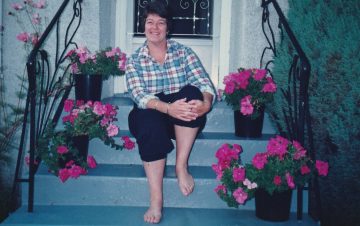
Dale on her front porch in Vancouver
This new role was, effectively, the most senior nursing role in the Vancouver Health Department, coordinating public health and community health for the entire region. However, the problem was that no one really understood what it meant. It was never quite clear what the responsibilities were and were not, and there was always friction between program and discipline leaders trying to clarify their various roles and responsibilities. After several years in that position, Dale took a 6 month leave to deal with exhaustion, and during her absence, there was a significant reorganization. Her position, along with several other discipline lead positions, was deleted. Dr. Blatherwick then offered her the job of Unit Director for the South East Health Unit, which she enjoyed because it provided a more clear line of responsibility. However, the health department at that time was still experiencing considerable tension, including friction with a number of medical leaders who felt they had the authority to determine nursing roles. Dale tried hard to bring nursing as a discipline forward in a specific way by integrating nursing theory into nursing practice. Although there were many successes, the medical resistance continued, and nursing staff still often got caught in the middle of those tensions.
Despite holding a major and senior leadership position in public health, Dale still took time for voluntary service. One example was her work as an Oxfam Global Health Project volunteer. Among her contributions to that organization was an invitation to be a member of a five person “observing and reporting” team sent to Peru. Following that trip, she did 64 presentations to various nursing worksites and organizations, trying to give people a better insight on international health challenges.
Eventually, the health care system underwent yet another reorganization, this time to integrate hospital and community together, and create an entirely new Health Board. As part of that process, those in charge felt that the answer to the dilemma of what to do with their senior public health people was to integrate some into hospitals and to give the others their notice. All of the unit director positions were therefore deleted and replaced with someone who had responsibility in both agencies. Dale remembers Heather Hay, a nursing leader at VGH, being incredibly respectful of Dale and her feelings around what was happening. One of the conditions of Dale’s two-year severance package was that if she took another position, she had to forfeit the severance award. However, Dale knew that waiting two years before reentering the workforce was far too long for her. As it happened, Canadian Nurses Association was looking for someone to be on an Advisory Committee for the Brazilian Nurses Association. They approached Dale to help out, and she took on a short-term consultancy with the CNA on that basis.
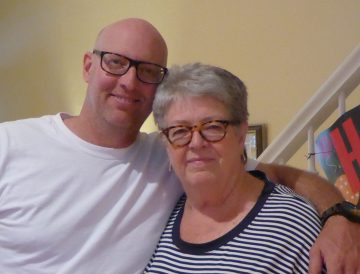
Dale with her son Jeff at her 75th birthday party
Also around that time, Dale took advantage of an outplacement counselling service provided as part of her severance. As one of the exercises in that program, she was asked to write about what her ideal role might look like. And, at just that time, the Registered Nurses Association of BC posted a vacancy that actually fit 80% of what she had described. She applied for and was hired into that position – RNABC Professional Practice Conduct Review Consultant. This was a position that used all of her leadership skills and she enjoyed it thoroughly. She remembers having to learn how to be a consultant and not a manager – two decidedly different roles. The person who guided her in that position was Rose Murakami, a former UBC and nursing administration colleague who had held that role before Dale. Retiring after three years in that position, Dale was later hired back on a part time basis until she eventually moved to Ottawa in August of 2005.
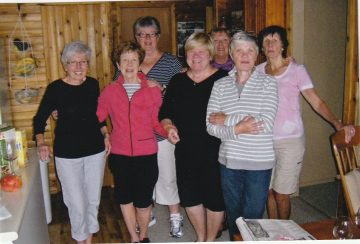
At a St. Paul’s Classmates reunion
Once she arrived in Ottawa, Dale learned that the executive director of the Canadian Nurses Foundation had resigned on short notice, so she took on that position for about six months to reorganize the role, and then (finally) retired for good. In retirement, Dale continued to be actively involved in the community, coming full circle to work with refugee families in English as a Second Language classes.
As of 2022, Dale lives in Ottawa with her partner of 35 years, Jane Ellis (former CNA Chief Operating Officer) and their little dog Buttons. Her son Jeff lives in Regina with his wife Sheryl (who is also a nurse) and their son Aiden. However, Dale continues to return to BC regularly to visit friends and family, including holding reunions with 7 or 8 of her St. Paul’s Nursing classmates, something they have enjoyed annually for the past 20 years.
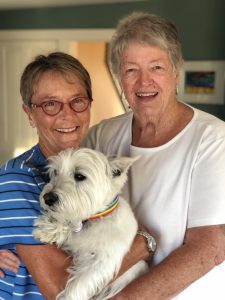
Dale with Jane and Buttons in Ottawa
Reflecting back, Dale thinks she would have loved to have had the opportunity to become a nurse practitioner at the time she did her master’s degree. However, with the availability of programs at that time, her Son would have had to move for two years to California, which made it prohibitive. At Portland, the NP program was more of a physician’s assistant program, which did not appeal to her. Although she would have loved to continue her career in a direct care role, she took the administrative management stream, believing that in order to make a difference in practice you had to have a position of power and authority. In that ambiguous role, it was hard to enact all of her aspirations, but she totally enjoyed the challenge. In some ways, Dale feels that she participated in the end of an era when nurse administrators saw themselves first as nurses and secondarily as administrators. She witnessed the tension of a new generation of nurses who sometimes felt their first allegiance was to the executive teams of their organization. During her years in a senior nursing leadership position, Dale had been actively involved in these complex conversations, and for a time she served as President of the organization known as “Nurse Administrators Association of BC.” Ultimately, she concluded that the time for nurse administrators to have their own professional organization had passed, and that group became part of the Health Executives of BC. In 1990, Dale was awarded the Registered Nurses Association of BC’s Award of Excellence in Nursing Administration, and in 2002, the UBC Nursing Alumni Award of Distinction.